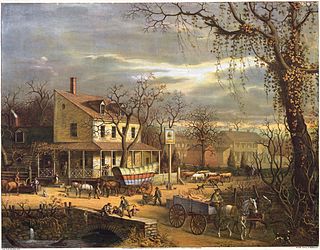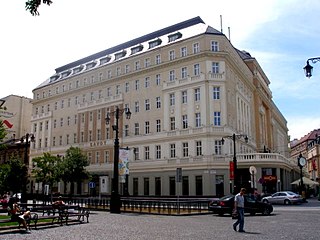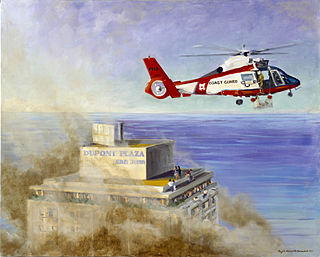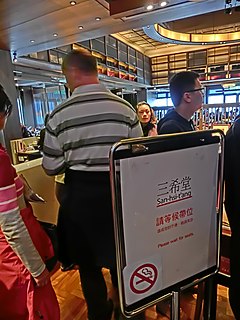
Inns are generally establishments or buildings where travelers can seek lodging, and usually, food and drink. Inns are typically located in the country or along a highway; before the advent of motorized transportation they also provided accommodation for horses.
The Civil Rights Cases, 109 U.S. 3 (1883), were a group of five landmark cases in which the Supreme Court of the United States held that the Thirteenth and Fourteenth Amendments did not empower Congress to outlaw racial discrimination by private individuals. The holding that the Thirteenth Amendment did not empower the federal government to punish racist acts done by private citizens would be overturned by the Supreme Court in the 1968 case Jones v. Alfred H. Mayer Co. The Fourteenth Amendment not applying to private entities, however, is still valid precedent to this day. Although the Fourteenth Amendment-related decision has never been overturned, in the 1964 case of Heart of Atlanta Motel, Inc. v. United States, the Supreme Court held that Congress could prohibit racial discrimination by private actors under the Commerce Clause, though that and other loose interpretations of the Clause to expand federal power have been subject to criticism.
Heart of Atlanta Motel, Inc. v. United States, 379 U.S. 241 (1964), was a landmark decision of the Supreme Court of the United States holding that the Commerce Clause gave the U.S. Congress power to force private businesses to abide by Title II of the Civil Rights Act of 1964, which prohibits discrimination on the basis of race, religion, or national origin in public accommodations.

The Civil Rights Act of 1964 is a landmark civil rights and labor law in the United States that outlaws discrimination based on race, color, religion, sex, and national origin. It prohibits unequal application of voter registration requirements, racial segregation in schools and public accommodations, and employment discrimination. The act "remains one of the most significant legislative achievements in American history".

A fire sprinkler system is an active fire protection method, consisting of a water supply system, providing adequate pressure and flowrate to a water distribution piping system, onto which fire sprinklers are connected. Although historically only used in factories and large commercial buildings, systems for homes and small buildings are now available at a cost-effective price. Fire sprinkler systems are extensively used worldwide, with over 40 million sprinkler heads fitted each year. Even though Fire Sprinkler Systems are a Life Saving System and are not designed to protect the building, 96% of buildings that had fires and were completely protected by fire sprinkler systems were controlled by the fire sprinklers alone.

Lodging refers to the use of a short-term dwelling, usually by renting the living space or sometimes through some other arrangement. People who travel and stay away from home for more than a day need lodging for sleep, rest, food, safety, shelter from cold temperatures or rain, storage of luggage and access to common household functions. Lodging is a form of the sharing economy.

A fire marshal, in the United States and Canada, is often a member of a state, provincial or territorial government, but may be part of a building department or a separate department altogether. Fire marshals' duties vary but usually include fire code enforcement or investigating fires for origin and cause. Fire marshals may be sworn law-enforcement officers and are often experienced firefighters. In larger cities with substantially developed fire departments the local fire departments are sometimes delegated some of the duties of the fire marshal.

Fire safety is the set of practices intended to reduce the destruction caused by fire. Fire safety measures include those that are intended to prevent the ignition of an uncontrolled fire and those that are used to limit the development and effects of a fire after it starts.
Bank regulation is a form of government regulation which subjects banks to certain requirements, restrictions and guidelines, designed to create market transparency between banking institutions and the individuals and corporations with whom they conduct business, among other things. As regulation focusing on key factors in the financial markets, it forms one of the three components of financial law, the other two being case law and self-regulating market practices.

The California Department of Fair Employment and Housing is an agency of California state government charged with the protection of residents from employment, housing and public accommodation discrimination, and hate violence. It is the largest state civil rights agency in the United States. It also provides representation to the victims of hate crimes. Originally a division within the Department of Industrial Relations, DFEH became a separate department in 1980. DFEH has a director who is appointed by the governor of California and maintains a total of five offices and five educational clinics throughout the state. Today, it is considered part of the California Business, Consumer Services, and Housing Agency.
The Information Technology Management Reform Act of 1996 is a United States federal law, designed to improve the way the federal government acquires, uses and disposes information technology (IT). It was passed as Division E of the National Defense Authorization Act for Fiscal Year 1996. Together with the Federal Acquisition Reform Act of 1996, it is known as the Clinger–Cohen Act.
A hotel tax or lodging tax is charged in most of the United States, to travelers when they rent accommodations in a hotel, inn, tourist home or house, motel, or other lodging, generally unless the stay is for a period of 30 days or more. In addition to sales tax, it is collected when payment is made for the accommodation, and it is then remitted by the lodging operator to the city or county. It can also be called hotel occupancy tax, in places like New York city and Texas. Despite its name, it generally applies to the same range of accommodations.

Food safety is used as a scientific method/discipline describing handling, preparation, and storage of food in ways that prevent food-borne illness. The occurrence of two or more cases of a similar illness resulting from the ingestion of a common food is known as a food-borne disease outbreak. This includes a number of routines that should be followed to avoid potential health hazards. In this way, food safety often overlaps with food defense to prevent harm to consumers. The tracks within this line of thought are safety between industry and the market and then between the market and the consumer. In considering industry to market practices, food safety considerations include the origins of food including the practices relating to food labeling, food hygiene, food additives and pesticide residues, as well as policies on biotechnology and food and guidelines for the management of governmental import and export inspection and certification systems for foods. In considering market to consumer practices, the usual thought is that food ought to be safe in the market and the concern is safe delivery and preparation of the food for the consumer.

The Dupont Plaza Hotel arson was a fire that occurred at the Hotel Dupont Plaza in San Juan, Puerto Rico, on New Year's Eve, December 31, 1986.
The history of fire safety legislation in the United Kingdom formally covers the period from the formation of the United Kingdom of Great Britain and Ireland in 1801 but is founded in the history of such legislation in England and Wales, and Scotland before 1708, and that of the Kingdom of Great Britain from 1707 to 1800.

Smoking in Taiwan is regulated by the Tobacco Hazards Prevention Act (Taiwan). Tobacco advertising is banned, and smoking is banned in all indoor public places. Taiwan was the second Asian country to institute an indoor smoking ban, after Bhutan. The Government of Taiwan is planning to extend the smoking ban to cars, motorbikes, and pedestrians.
Public accommodations, in the law of the United States, are generally defined as facilities, whether publicly or privately owned, that are used by the public at large. Examples include retail stores, rental establishments, and service establishments as well as educational institutions, recreational facilities, and service centers.
Tobacco is an agricultural product acting as a stimulant triggering complex biochemical and neurotransmitter disruptions. Its main ingredient is nicotine and it is present in all cigarettes. Early tobacco usage was for medical cures and religious purposes. In the early 1900s, cigarette usage became increasingly popular when it was sold in mass amounts. In 1964, the Surgeon General of the United States wrote a report concerning the dangers of cigarette smoking. In the United States, for the past 50 years efforts have been made so that the public should be aware of the risks of tobacco usage.

The Federal Fire Prevention and Control Act of 1974 was created in response to the 1973 National Commission on Fire Prevention and Control report, America Burning. The report's authors estimated fires caused 12,000 deaths, 300,000 serious injuries and $11.4 billion in property damage annually in the United States, asserting that "the richest and most technologically advanced nation in the world leads all the major industrialized countries in per capita deaths and property loss from fire." The report proposed that a federal agency be established to help combat the growing problem of fatal fires happening throughout the country. The S. 1769 legislation was passed by the 93rd Congressional session and enacted by the 38th President of the United States Gerald Ford on October 29, 1974.

The American Hotel and Lodging Association is an industry trade group with thousands of members including hotel brands, owners, management companies, Real Estate Investment Trusts (REITs), independent hotels, bed and breakfasts, state hotel associations and industry partners and suppliers. Its role at various times has included the publication of hotel directories, market research, support of standardization efforts, public or political advocacy for the interests of hotel owners and the establishment or promotion of training programs and facilities for hotel personnel.












